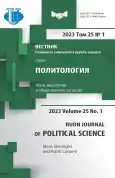Ideas, Ideologies and Public Consent: Introducing the Issue
- Authors: Gutorov V.A.1, Shirinyants A.A.2, Kazarinova D.B.3
-
Affiliations:
- St Petersburg State University, Saint Petersburg
- Lomonosov Moscow State University
- People’s Friendship University of Russia
- Issue: Vol 25, No 1 (2023): Ideas, Ideologies and Public Consent
- Pages: 9-20
- Section: EDITORIAL ARTICLE
- URL: https://journal-vniispk.ru/2313-1438/article/view/322240
- DOI: https://doi.org/10.22363/2313-1438-2023-25-1-9-20
- ID: 322240
Cite item
Full Text
Abstract
The concept of consent is essential for every society society, affecting almost all its spheres - from everyday life to socio-political bases. Therefore, it cannot be considered accidental that both the idea itself and the diverse directions of its interpretation, dating back to the era of early modernity, today constitute one of the most priorities, intellectually saturated segments in modern socio-political theory. It is impossible to deny the appeal of the doctrine of personal consent (and the parallel thesis that no government is legitimate unless it acts without the consent of the governed). It has had a great influence on the political institutions of many modern states and has been a major factor in the direction that political theory has taken since 1600. In the second half of the 20th century, two approaches prevailed in political theory, within the framework of which the process of formation of the consensus tradition: personal and historical ones. The most impact to the theory is made by criticism of the unilinear model of consent analysis in the works of George Klosko, analysis by R.D. Bernstein of the problem of consent in the form of critical remarks on the philosophical position of R. Rorty, the concept of socialist “consent strategy” developed in the 1980s by E. Laclau and Sh. Mouffe, the controversy of the Canadian political philosopher James Tully with neo-Marxist theorists, the philosophical interpretation of consent by Jürgen Habermas as part of his analysis of the “rationalization paradox” etc. This theoretical and methodological frame becomes a basis for the thematic volume, where the articles on the history of socio-political thought are followed by the chapter devoted to the problems of Russia between cleavages and social harmony. Russian problems are blended with an international context, and the issue ends with an attempt to understand the ideological attitudes of modern youth.
About the authors
Vladimir A. Gutorov
St Petersburg State University, Saint Petersburg
Author for correspondence.
Email: gut-50@mail.ru
ORCID iD: 0000-0001-8063-2558
Doctor of Science in Philosophy, Professor, Head of the Department of Theory and Philosophy of Politics, Faculty of Political Science
Saint Petersburg, Russian FederationAlexander A. Shirinyants
Lomonosov Moscow State University
Email: jants@yandex.ru
ORCID iD: 0000-0002-6949-2256
Doctor of Science in Political Sciences, Professor, Head of the Department of History of Social and Political Doctrines of the Faculty of Political Science
Moscow, Russian FederationDaria B. Kazarinova
People’s Friendship University of Russia
Email: kazarinova-db@rudn.ru
ORCID iD: 0000-0002-9416-5898
PhD in Political Science, Associate Professor of the Department of Comparative Politics
Moscow, Russian FederationReferences
- Bernstein, R.J. (2007). New constellation: The ethical-political horizons of modernity/ postmodernity. Cambridge.
- Edmundson, W.A. (2018). Moral education and the ethics of consent. In A. Müller & P. Schaber (Eds.), The Routledge handbook of the ethics of consent (pp. 372-383). London; New York.
- Estlund, D. (2018). Normative consent and authority. In A. Müller & P. Schaber (Eds.), The Routledge handbook of the ethics of consent (pp. 359-371). London; New York.
- Gramsci, A. (1971). Selections from the Prison Notebooks. London.
- Habermas, J. (1984). The theory of communicative action. Vol. 1. Reason and the rationalization of society. Boston.
- Howarth, D.R. (2013). Poststructuralism and after: Structure, subjectivity and power. Houndmills, Basingstoke.
- Klosko, G. (2004). Multiple principles of political obligation. Political Theory, 32(6), 801-824.
- Klosko, G. (2005). Political obligations. Oxford; New York.
- Klosko, G. (2018). Consent theory of political obligation. In A. Müller & P. Schaber (Eds.), The Routledge handbook of the ethics of consent (pp. 348-358). London; New York.
- Klosko, G. (2019). Why Should We Obey the Law? Cambridge.
- Laclau, E., & Mouffe, Ch. (1985). Hegemony and socialist strategy: Towards a radical democratic politics. London; New York.
- Simmons, A.J. (1979). Moral principles and political obligations. New Jersey.
- Davaney, S.G., & Frisina, W.G. (Eds.). (2006). The Pragmatic Century: Conversations with Richard J. Bernstein. Albany.
- Tuckness, A. (2018). Historical perspectives in political philosophy. In A. Müller & P. Schaber (Eds.), The Routledge handbook of the ethics of consent (pp. 337-347). London; New York.
- Tully, J. (1995). Strange multiplicity: constitutionalism in an age of diversity. Cambridge.
- Wellmer, A. (1985). Reason, utopia, and the Dialectic of Enlightenment. In R.J. Bernstein (Ed.), Habermas and Modernity (pp. 35-67). Cambridge, Massachusetts.
- White, S.K. (1988). The recent work of Jürgen Habermas: Reason, justice and modernity. Cambridge.
Supplementary files









